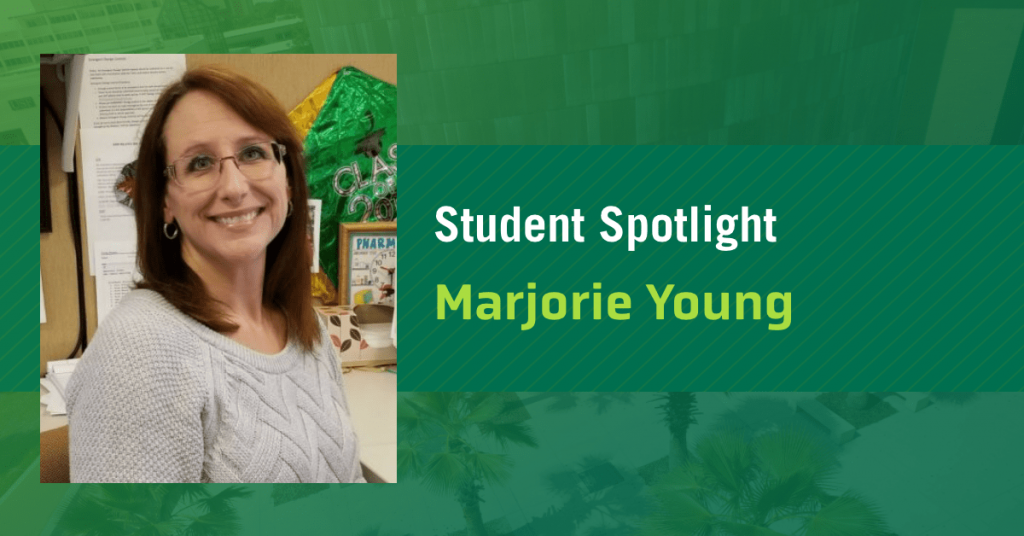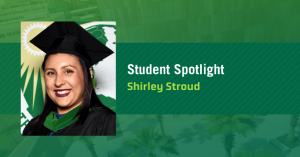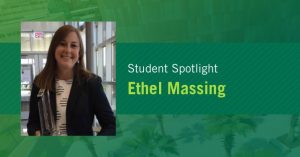With more than 20 years experience working as a pharmacist, Marjorie Young looked around at her options for a career transition and saw one thing was clear; she was going to need a tech background to continue growing as a healthcare professional.
A resident of Huntington, New York, Young now works as a clinical analyst for a local health system. She has transitioned lessons learned in pursuit of her Master of Science in Health Informatics into her everyday work and used it to help her attain new certifications.
Recently, we caught up with Young to find out more about where her career is headed and how her time at USF has helped shape her future.
Q: Tell us a bit about your background.
A: I’ve been a pharmacist for well over twenty years, and pharmacy as an industry barely resembles what it was when I graduated from pharmacy school. I have worked in retail, hospital, long term care, and infusion, but have always been drawn to the technology that has been adopted over the course of my career.
Computers were used then to generate labels and transmit billing information; now we can query and share controlled substance usage information across states, analyze and store patient data automatically through device integration, and predict patient-specific drug kinetics based on gene mapping. It’s fascinating to me.
Q: What was it that led you to consider getting a graduate education in health informatics?
A: The job market in my area is extremely competitive since we have so many schools of pharmacy in our state. The average student coming out of school now has a doctorate degree, and likely has completed a residency or specialty training.
While I have over twenty years of experience and have participated in continuing education faithfully, my bachelor’s degree cannot compete with what the industry standard has become. I knew that the only way I could stand out in the crowd would be to specialize in an area that did not come easily to the record number of students enrolled in pharmacy school today. Many of my colleagues were returning to school for MBA’s in search of management-level positions, or to get their doctorates. I decided that if I was going to invest the time and effort into myself, it would be to do more than simply be more qualified to do the job I was already doing.
Q: Tell us a little bit about your work and in what way your master’s degree has helped you in your current position?
A: Two months prior to graduation from USF, I was hired by a local health system as a clinical analyst. My goal was to get certified in the Epic system, and one month after graduation I passed my first certification. Recently, I was able to train for my second certification in their oncology module, Beacon.
I felt prepared to handle the fast-paced learning thanks to my time at USF. I had the self-discipline and strategies needed to absorb the large amounts of information necessary for certification in a system like Epic. The USF program exposed me to a wide range of topics and information resources, gave me the skills to apply information and draft professional recommendations and documents. It exposed me to using the applications and tools I was expected to be familiar with from day one on the job and taught me the time management skills needed to balance stressful deadlines with life.
Q: What are some developments in the world of Health IT that excite you and what do you think will have the biggest impact on your work?
A: Healthcare regulations and financial challenges are at the forefront of the industry today. Nothing stays the same for very long, requiring constant revision and updates based on ever-changing rules and trends. This definitely has the largest impact on my work, our work is never done! What excites me, though, is how technology enables us to make healthcare patient-centered: with up-to-date point of care information obtained from other healthcare providers, labs, devices, and patient-specific factors such as genetic information, practitioners are able to provide care that is custom-made for that person. I love that one provider can look at a sample, call a specialist who can access it in real time from another location, and the patient can avoid extended stays in the ER or hospital waiting for consults. Treatment can begin right away, which gives patients the best outcomes.
Q: What would you say was the most valuable thing you took from studying Health Informatics with USF?
A: My USF experience exposed me to so many of the tools I am using every day, as well as how to research and learn independently when needed. I feel like I can learn anything, and that is something for someone who had been out of school for so long!
The classes I took during the USF master’s program were very useful in the real world—not only from a content point of view, but from a rigorous learning perspective as well. I reference information learned in USF courses on a daily basis in practice—notably project management, which I had no frame of reference for in my previous work.
Q: For someone who is considering a transition to informatics from another area of healthcare, why would you say they should move towards a career in health IT?
A: IT is the present and future of healthcare. Competition is fierce, and it’s all about providing the best value and outcomes. As each new health care service is added, we are needed to make it happen, and happen safely. Health care providers “in the trenches” need someone who speaks their language as well as the language of technology—a translator who understands not only what they need, but how to get it done.
Q: How do you expect your degree from USF will help in you in the future?
A: On-the-job-training is great for being prepared for what you are doing now, but my degree prepared me for almost anything I’d be doing across the industry, from working in tech areas such as database maintenance all the way to business-facing needs such as revenue integrity. I can move in any direction that interests me, and be confident that I have a firm foundation.
Q: What attracted you to the online program from USF Health Morsani College of Medicine?
A: When I started the program, I was working extended overnight shifts in the hospital as well as raising children, so I could not consistently attend day or evening classes in a traditional setting. While online classes certainly have their own challenges, I would not have been able to make this complete, positive change in my life any other way.
Q: What was your favorite class and why?
A: The classes I ended up enjoying the most were actually the most challenging. The law class was the most interesting, but I got the most out of project management. I was able to employ creativity and personalize the documents that we were creating. The database management class was similar, in learning artistic methods of data visualization.
Q: What is a fun fact about you?
A: I volunteer for a Boston Terrier rescue group, and have two at home. I would have many more if I had more space and time!



